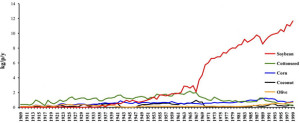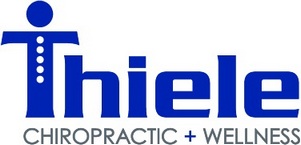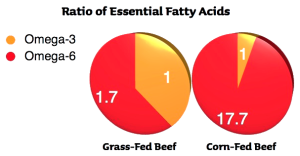What are they and what do they do?

[ Image courtesy of cbenjasuwan at FreeDigitalPhotos.net]
You may have heard of Omega 3 Fatty Acids (a.k.a. Fish Oils) by now and you may have heard a bit about Omega 6 Fatty Acids, but you might not be clear on what they are and why they are important. Most importantly you might not be aware of how they are impacting your health!
Omega 3 and 6 FAs are essential, meaning we cannot make them on our own from other sources. They are a necessary and vital part of our diet. They are both considered polyunsaturated fats that differ in chemical structure. There are two key Omega 3 FAs, EPA – eicosapentaenoic acid and DHA – docosahexaenoic. These two types are typically found in various types of fish: salmon, mackerel, sardines, and even krill. You can also obtain an Omega 3 called ALA – alpha-linolenic acid from vegetarian sources like: flax seeds, walnuts, and many greens/vegetables (kale, spinach, brussel sprouts). ALA needs to be converted into EPA and DHA in the body and the amount the body is able to convert may not be sufficient. Omega 3 FAs are important because they help build hormones that the body uses to control numerous functions: immunity, cell membrane structure, blood clotting etc. Omega 3 FAs as we will see are anti-inflammatory in nature and this can have a significant impact on one’s health.
Omega 6 FAs can be found in many foods, most of which are refined type foods that contain refined vegetable oils like sunflower, corn, soybean and cottonseed oils. Most of these oils are what you would find in many ‘junk foods’ like cookies, snacks, sweets, etc. Omega 6 FAs can also be found in other healthy options such as nuts. Omega 6 FAs are also key parts used in building hormones in the body that are responsible for inflammation (part of the immune response), and blood clotting.
Connecting the Dots
While both Omega 3s and 6s are essential for our bodies the problem arises when we look at the quantity that we get of each type in the typical Western Diet. 3s and 6s are designed to be consumed in a relatively equal ratio (1:1 or 1:2). The Western Diet heavily skews the intake of Omega 6s compared to 3s. The ratio of 3s:6s is so skewed that most data shows it to be 1:20 or higher in the U.S! We eat far too many processed, refined foods made with vegetable oils. Much of our Omega 6 content in this country comes from soybean oil as it is an inexpensive and readily accessible additive to snack foods (I know this might not be a popular thought amongst our Iowa farmers).

Since 6s tend to be pro-inflammatory and 3s are anti-inflammatory one can see how such a large imbalance favoring 6s can lead to excessive inflammation in the body. There are a vast number of inflammatory based illnesses in this country that are likely due to what we eat: cardiovascular disease, high blood pressure, obesity, cancer, autoimmune diseases, asthma, etc. There are even links to ADHD, depression, and violent behavior. The quickest way to change these health issues is by changing what we put on our plates.
The Fix
The way to bring the balance back between Omega 3s and 6s is to increase the deficient Omega 3s and decrease the excessive Omega 6s in our diet.
- Reduce as many refined and processed foods as possible.
- Eat more natural foods, especially those higher in Omega 3s: vegetables, fatty fish, grass fed beef or wild game, some nuts and seeds.
We hope that most of our patients eat a healthy anti-inflammatory based diet that provides them with most all nutrients needed to stay healthy. There are only a few things that we feel should be supplemented and Omega 3 FAs are one of those things. The main reason for it being a necessary supplement is that we need to exercise caution when eating fish as it tends to be high in mercury content these days. Supplementation with a HIGH QUALITY Omega 3 oil is essential for a health diet. I stress ‘high quality’ because supplements range from high quality to basically garbage.
Remember high mercury content in fish can also mean high mercury content in fish oils! If your fish oil (omega 3 oil) smells, tastes, or causes you to burp a fishy flavor it probably means it hasn’t been purified well enough to remove fish impurities or the mercury for that matter. I, for one, am not a fan of a rancid fish taste!
If I can ever be of help in selecting a high quality fish oil for you and your family to use please let me know. We do carry a great product in the office that my family uses on a daily basis. It tastes so good we take straight oil (no capsules) and my little girls see it as a treat!
If you have any questions please feel free to ask the next time you are in the office or send us an email. I hope this information helps you better understand how Omega 3s impact your health and allow you to take one more step to improving your health and living the life you deserve.


Nutritionists call omega-3 and omega-6 fatty acids “essential” fats for good reason. The human body needs them for many functions, from building healthy cells to maintaining brain and nerve function. Our bodies can’t produce them. The only source is food.
Essential indeed! It is one of the supplements that I suggest for all of my patients who are expecting. I find that most OBs don’t really encourage Omega-3s like they probably should. It helps so that mom has the appropriate building blocks for her baby’s brain, eye and nerve development. All rather important structures! It is also highly recommended while mom continues to breastfeed as well. Thanks for the comment!
For avoiding this type of situations he or she should
always check blood pressure level through body fat
analyzer. It’s important that a sound, realistic,sustainable, long-lasting treatment
for obesity must be found or nothing will ever work.
These two interventions could lead to a more accurate reading
of your blood pressure, and could make the difference between a
diagnosis of high blood pressure, or not.
I agree that obesity is a major issue for far too many people, especially in this country. Let’s face it, eating well in the U.S. is not an easy task. Eating good, natural foods is the best ‘diet’ anyone can be on. They typically need guidance on what constitutes ‘good, natural’ food. Supplementation should essentially be minimal. As far as blood pressure, I encourage my patients to evaluate the blood pressure over a course of time and at various times of the day. One reading isn’t an accurate depiction of what your blood pressure is like. It varies greatly depending on many factors including time of day and stress levels.